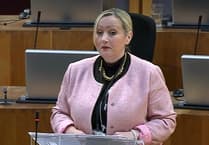Councils in mid and north Wales are warning that service cuts and council tax increases remain inevitable following the local government financial settlement announced by the Welsh Government, despite an average increase of 7.9 per cent.
Gwynedd Council’s budget will increase by seven per cent – below the Welsh average and one of the lowest of all 22 authorities in Wales – from £213 million last year to £227m.
Council leader Dyfrig Siencyn said: “Since the Westminster Government’s autumn budget we have anticipated that things will be bleak for us and this announcement confirms that we will face a significant financial shortfall in 2023/24.
“At first glance, it appears that things will not be as bad as forecast a few weeks ago as Gwynedd will receive more money next year.
“But in reality, this settlement is among the worst in real terms that we as a council have ever received.
Amount received by Gwynedd from the Welsh Government for 2023.
“The costs of everything needed to provide local services for Gwynedd – such as energy, goods and labour – have increased by 11 per cent since the autumn, which is an additional cost of around £22m.
“At the same time the demand for services such as homelessness has shot up as a result of the cost of living crisis.
“The increase of £14m in the settlement is simply not sufficient to cover this.
“So, we have no choice but to either cut services, increase council tax significantly or strike a responsible balance between the two.”
Ceredigion County Council will see an 8.2 per cent increase in its budget from March, giving it an extra £9.8m compared to last year’s settlement of £119.238m.
Ceredigion County Council said it “welcomed” the increase, but told the Cambrian News it is “facing significant and challenging cost pressures totalling over £20m just for next financial year, which far exceeds current levels of general inflation.”
“The £9.6m funding increase covers less than 50 per cent of the amount needed and means there is a funding gap of over £10m,” a spokesperson said. “Over the coming weeks, the council will be considering and finalising targeted areas for budget savings, budget reductions and greater Income generation.
Ceredigion's settlement for 2023.
“These will be discussed and considered by our Overview and Scrutiny Committees in February. Consideration will also be given to the level of council tax increase that will be required to maintain frontline public services, at a time when those services have never been more critical.”
Powys County Council is set to receive an 8.7 per cent increase in funding from the Welsh Government for the 2023-2024 financial year.
This equates to an increase of just under £18.3m and will see the council’s funding rise from £210.090m this year to £228.388m for next year – the fifth highest increase in Wales.
The extra funding has been welcomed by Powys County Council’s finance chief, but he warns that tough decisions will still be needed due to the cost-of-living crisis.
Finance portfolio holder Cllr David Thomas said: “While we welcome the provisional settlement the council is still facing tough decisions due to continuing challenging economic circumstances.
“The economic outlook remains bleak which means that we will still have to take difficult decisions to meet budget gaps due to energy bills, inflation and pay costs.
“We will still have to consult our communities on some very difficult decisions to help ensure that vital services remain viable for those who need them.”
Increase for Ceredigion from the Welsh Government for 2023.
Rebecca Evans MS, the Welsh Government’s Minister for Finance and Local Government said: “This settlement builds on improved allocations in recent years and provides local authorities with a stable platform on which to plan their budgets for the coming financial year and beyond.
“When I announced our budget I prioritised the protection of frontline public services, and this increased funding to councils – who deliver so many of these services – is a vital part of that.’
“I recognise however that inflationary pressures being faced by services mean that local authorities will still need to make difficult decisions in setting their budgets.
“We will continue to work closely with local government to meet the shared challenges we face and deliver services to benefit the people of Wales.”
Plaid Cymru said the local government settlement for next year has fallen “way short” of what’s needed to stop further cuts to public services.
Plaid Cymru’s local government spokesperson in the Senedd, Llyr Gruffydd MS said the settlement was the “price” of Westminster’s decision to impose austerity on Wales.
He added the consequences would “cost livelihoods and lives”.
Increase for Gwynedd is below the Welsh average of 7.9%.
The Plaid Cymru MS said that whilst any additional support was “welcome”, some parts of Wales would now see huge rises in council tax.
Mr Gruffydd said the Welsh Government should give councils “greater flexibility” on how to spend their cash if they were unable to provide the funding needed.
“Whilst the funding formula used for local council settlements always throws up winners and losers, the biggest losers are those families and individuals who will be left with reduced support in their hour of need,” he said.
Liberal Democrat leader and Mid and West Wales MS Jane Dodds said she would have “liked to see more support for local government to ensure vital services they provide can continue”.
The Welsh Government has started a seven-week consultation on the provisional settlement, which will end on 2 February.
Councils are expected to set their budgets, including the level of council tax which is added to the government funding, in late February or early March.




